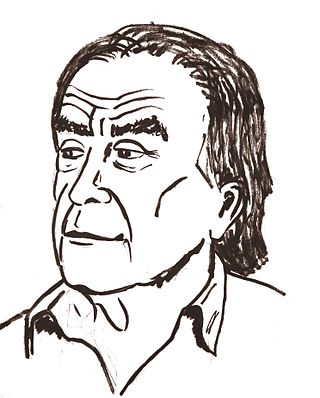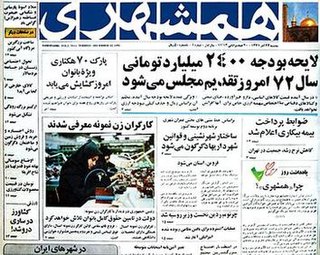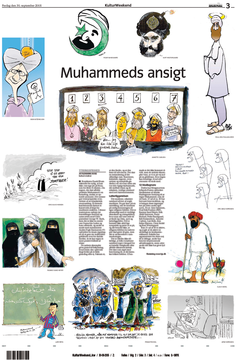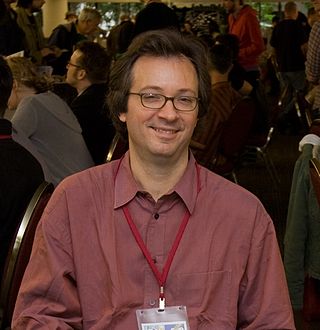Related Research Articles

Michael Leunig, typically referred to as Leunig, is an Australian cartoonist. His works include The Curly Pyjama Letters, cartoon books The Essential Leunig, The Wayward Leunig, The Stick, Goatperson, Short Notes from the Long History of Happiness and Curly Verse, among others and The Lot, a compilation of his 'Curly World' newspaper columns. Leunig has also written a book of prayers, When I Talk To You.

Gerald Anthony Scarfe is an English satirical cartoonist and illustrator. He has worked as editorial cartoonist for The Sunday Times and illustrator for The New Yorker.

The Islamic Human Rights Commission (IHRC) is a non-profit organisation based in London. Its stated mission is to "champion the rights & duties revealed for human beings" and to "promote a new social [and] international order, based on truth, justice, righteousness [and] generosity, rather than selfish interest." The group was established in 1997. The organisation, since 2007, has held consultative status with the United Nations Department of Economic and Social Affairs.

Carlos Latuff is a Brazilian political cartoonist. His work deals with themes such as anti-Western sentiment, anti-capitalism, and opposition to U.S. military intervention in foreign countries. He is best-known for his images depicting the Israeli–Palestinian conflict and the Arab Spring.

Nikahang Kowsar, also known as Nik Kowsar is an Iranian-Canadian cartoonist, journalist, and blogger, currently living in Washington, D.C., US. Kowsar was also a reformist candidate for the second term of city council of Tehran in 2003, an election won by the conservative candidates of Abadgaran.

Hamshahri is a major Iranian national Persian-language newspaper in Tehran.
Michael Patrick Ramirez is an American cartoonist for the Las Vegas Review-Journal. His cartoons present mostly conservative viewpoints. He is a two-time Pulitzer Prize winner.
Mahmoud Ahmadinejad was President of Iran from 3 August 2005 to 3 August 2013, and during that time had repeatedly made contentious speeches and statements against Israel. Ahmadinejad refused to call Israel by name, instead calling it the “Zionist regime”. He has called for the "elimination of the Zionist regime". Ahmadinejad took part in a protest called "The World Without Zionism" and has derided Israel on numerous occasions. He has urged regional powers to cut diplomatic and economic ties with Israel and halt oil sales. Tensions have risen over Iran's nuclear program. He has also provided funding, training and arms to Hezbollah and Hamas.
The Jyllands-Posten Muhammad cartoons were first published by Jyllands-Posten in late September 2005; approximately two weeks later, nearly 3,500 people demonstrated peacefully in Copenhagen. In November, several European newspapers re-published the images, triggering more protests.
There are several incidents involving controversial caricatures in the press media.

The Quds Force is one of five branches of Iran's Islamic Revolutionary Guard Corps (IRGC) specializing in unconventional warfare and military intelligence operations. U.S. Army's Iraq War General Stanley McChrystal describes the Quds Force as an organization analogous to a combination of the CIA and the Joint Special Operations Command (JSOC) in the United States. Responsible for extraterritorial operations, the Quds Force supports non-state actors in many countries, including Hezbollah, Hamas, Palestinian Islamic Jihad, the Houthi movement, and Shia militias in Iraq, Syria, and Afghanistan. According to Michael Wigginton et al., the Al-Quds Force is "a classic example of state-sponsored terrorism."

Mana Neyestani is an Iranian cartoonist, illustrator, and comic book creator whose work appears internationally in economic, intellectual, political, and cultural magazines. Mana is particularly known for his work for reformist papers in Iran and Persian language websites Radio Zamaneh, Tavaana: E-Learning Institute for Iranian Civil Society, and IranWire. He is also well-known because of his cartoons about Iranian presidential election, 2009. He is the 2010 recipient of the Cartoonists Rights Network International Award for Courage in Editorial Cartooning. Mana lives in France.
International Holocaust Cartoon Contest was a 2006 cartoon competition, sponsored by the Iranian newspaper Hamshahri, to denounce what it called Western "double standards on freedom of speech". The event was staged in response to the Jyllands-Posten Muhammad cartoons controversy. The United States State Department, the Israeli Foreign Ministry and United Nations Secretary-General Kofi Annan, among others, strongly criticized the contest.

The Jyllands-Posten Muhammad cartoons controversy began after the Danish newspaper Jyllands-Posten published 12 editorial cartoons on 30 September 2005 depicting Muhammad, the leader of Islam, in what it said was a response to the debate over criticism of Islam and self-censorship. Muslim groups in Denmark complained, sparking protests around the world, including violence and riots in some Muslim countries.

Frederick Theodore Rall III is an American columnist, syndicated editorial cartoonist, and author. His political cartoons often appear in a multi-panel comic-strip format and frequently blend comic-strip and editorial-cartoon conventions. At their peak, Rall's cartoons appeared in approximately 100 newspapers around the United States. He was president of the Association of American Editorial Cartoonists from 2008 to 2009.

Holocartoons is an Iranian website critical of Zionism launched in August 2010. The site, which opens to the Pink Panther theme song, aims to undermine the historic dimensions of the mass murder of Jews during World War II. The site is based on a comic book written by Omid Mehdinejad and illustrated by Maziar Bijani. In the preface it opens as following:
This book tends to denounce the conspicuous lie of the "planed [sic] murder of 6 million Jews during the Second World War" allegedly called "Holocaust".

Michel Kichka is an Israeli cartoonist and illustrator of Belgian origin. His father was Holocaust survivor Henri Kichka.

Quds Day, officially known as International Quds Day, is an annual pro-Palestinian event held on the last Friday of the Islamic holy month of Ramadan to express support for Palestinians and oppose Israel and Zionism. It takes its name from the Arabic name for Jerusalem: al-Quds.
References
- ↑ "Iran Holocaust-denying website angers Israel". Tabnak.ir. August 5, 2010. Archived from the original on April 18, 2012.
- ↑ "Holocaust-Satire-Book on AlQuds-Day". M.A.Ramin. October 10, 2008.
- ↑ "Iran launches cartoon website aimed at questioning the Holocaust". Haaretz. August 5, 2010.